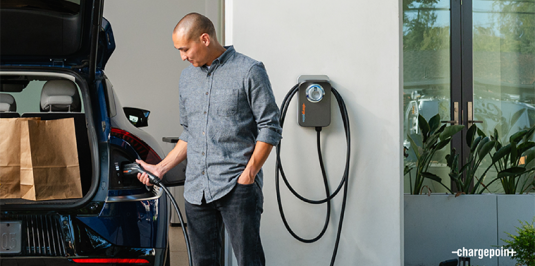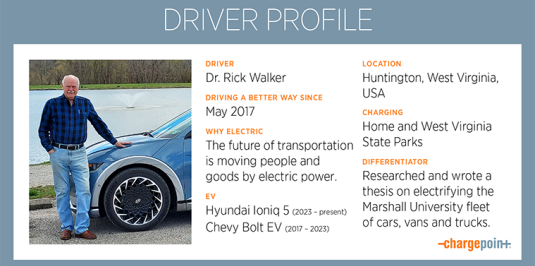
Perhaps you’re chewing on the age-old question of how to save more money. But where should you start? You want more bucket-list adventures with loved ones. You want to remodel your kitchen for cozier quality time at home. You want to do more than navigate your present: You want to save for your future.
Your plan for accelerating your savings might not include your vehicle. But it should. Switching to an EV can save you close to a thousand dollars a year on fuel alone and thousands more over the lifetime of your vehicle. Going electric isn’t just the right thing for our planet and humanity — it’s also one of the best things you can do for your wallet and goals.
Calculate how much money you can save by driving electric
Before taking the exciting leap of investing in an EV or home charger, it’s wise to calculate your baseline savings to see if this is right for your goals. While the tool below calculates your fuel savings alone — you’ll save even more with federal and state incentives for EVs and smart home chargers.
To calculate your EV savings, move the toggles below to accurately capture information about your EV lifestyle.
How do electric cars save money?
Learn more about how driving an EV will charge your savings rate.
1. Fuel savings
Gas for your car is expensive. Did we also mention it’s just plain bad for human health, animals, the atmosphere — basically, everything and everyone? Gas prices are notoriously volatile, which makes budgeting even harder.
Give it up for electricity. Electricity is better for the planet and your wallet, with much less pollution and stable pricing. By switching to an EV, the average U.S. driver will save between $700 and $1,000 on fuel alone annually.
It gets even better. Investing in a smart home charger like ChargePoint Home Flex allows you to schedule your EV charging for off-peak hours when electricity is cheapest. Save even more money with the simple press of a button on your ChargePoint app.
P.S. Many utilities enable customers to opt into completely clean and renewable energy for little to no extra money, allowing people to invest even more in the clean energy transition at home with their wallets.
2. Maintenance and repair savings
EVs have additional benefits over gas cars. Besides generating less pollution and more energy efficiency, EVs require much less maintenance and repair than internal combustion engine (ICE) cars, adding up to significant savings over time. One study estimates EV owners can expect to save close to $5,000 on maintenance and repair over an EV’s lifetime compared with a gas-guzzling vehicle.
Imagine what else you can do with that huge chunk of cash. Pay down home loans or college debt. Go on the trip of a lifetime. Remodel a bathroom. Save for retirement. The list is endless. But whatever you choose, it sure beats years of costly oil changes and spark plug replacements.
3. Savings from tax incentives and rebates
Keeping track of all the new tax incentives and rebates for EVs and EV chargers is overwhelming. It’s a great problem to have, but it’s essential to make a game plan so you can maximize your savings.
Here’s how you can save even more money by switching to an EV:
- Receive a federal tax credit of up to $7,500 for buying a new EV. This tax credit even extends as far back as vehicles purchased in 2010.
- Explore additional tax incentives, rebates and grants in your home state for buying an EV.
- EVs also qualify for HOV lane access and toll reductions, saving you money and time depending on your home state.
Here’s how you can save even more money by investing in an EV home charger:
- Receive a federal tax credit of up to $1,000 on an EV home charger such as ChargePoint Home Flex. This tax credit covers 30% of the hardware and installation cost up to $1,000 and lasts through 2032.
- Explore additional tax incentives, rebates and grants in your home state for investing in a home charger. These vary by state but often include incentives from counties and utility companies for an even more significant savings boost.
But what about the price of EVs?
You might wonder how EV prices impact your EV savings. While EVs can be more expensive than gas vehicles, EV prices continue to plummet. One study found that in 2023 alone, the average price for a new EV declined by $14,300 in a single year. Currently, the average cost difference between a new EV and a gas car is $2,800 — significantly below the average lifetime savings of owning an EV. And many new EV makes and models with lower MSRPs, such as the Chevrolet Bolt and Nissan LEAF, continue to hit the market.
EVs win for the lowest total cost of ownership
Evaluated holistically, EVs beat gas vehicles hands down when it comes to the total cost of ownership (TCO). Fuel, maintenance, repair, tax incentives and rebate savings add up over the lifetime of an EV to save thousands of dollars compared with a gas vehicle. The cost savings of electric cars can’t be beat.
There’s no doubt about it. By choosing to drive better, you will also save better. And dare we say, live better?







